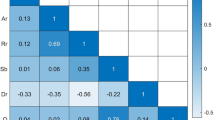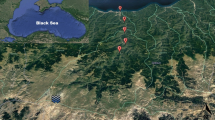Abstract
A single study investigates the possibility of using adaptive control of the reservoir Vranov Reservoir situated on the Dyje River. The control algorithm uses a fuzzy model that approximates the I/O relationships contained in the behaviour matrix of the target reservoir, constructed using the differential evolution optimisation method. Recurring predictions of water inflows into the reservoir are constructed using a fuzzy model, which is based on the idea of similarity of the course of a real series of average monthly flows during the year. After calibration of the control and predictive models, the whole control is tested for the period 2004–2018. The results obtained by the discussed models are compared with the results obtained by dispatching graphs. The results of adaptive control show that the method is very suitable for driving during long low-water periods. In periods with plentiful water, the results barely differ.








Similar content being viewed by others
REFERENCES
Amnatsan, S., Yoshikawa, S., and Kanae S., Improved forecasting of extreme monthly reservoir inflow using an analogue-based forecasting method: A case study of the Sirikit Dam in Thailand, Water (Switzerland), 2018, vol. 10, no. 11.
Annual report on the hydrometeorological situation in the Czech Republic 2017–2018, Český hydrometeorologický ústav, Na Šabatce 2050/17, 143 06 Praha 4, http://portal.chmi.cz/files/portal/docs/hydro/sucho/ Zpravy/ROK_2018.pdf
Bezdec, J.C., Pattern Recognition with Fuzzy Objective Function Algorithms, Plenum Press, New York, 1981. https://doi.org/10.1007/978-1-4757-0450-1
Chaves, P., Tsukatani, T., and Kojiri, T., Operation of storage reservoir for water quality by using optimization and artificial intelligence techniques, Mathematics and Computers in Simulation, 2004, vol: 67, no. 4, pp. 419–432.
Chaves, P. and Kojiri. T., Deriving reservoir operational strategies considering water quantity and quality objectives by stochastic fuzzy neural networks, Adv. Water Resour., 2007, vol. 30, pp. 1329–1341. https://doi.org/10.1016/j.advwatres.2006.11.011
Deb, K., Multi-Objective Optimization Using Evolutionary Algorithms, Chichester, UK: John Wiley and Sons, 2001.
Handling order for VD Vranov, Prague, 2011, pp. 1–77.
Haupt, R.L. and Haupt, S.E., Practical Genetic Algorithms, New York: John Wiley and Sons, 1998.
Holland, J.H., Adaptation in Natural and Artificial Systems: An introductory Analysis with Applications to Biology, Control and Artificial Intelligence, MA, USA: MIT Press, Cambridge, 1975.
Janal, P. and Stary, M., Fuzzy model used for the prediction of a state of emergency for a river basin in the case of a flash flood—PART 2, J. Hydrol. Hydromech., 2012, vol. 60, no. 3, pp. 162–173.
Kasparek, L., Estimation of the volume of reservoir needed to compensate for the decrease in inflow due to climate change, Ministry of Agriculture, VÚV Prague, Prague, 2005.
Kozel, T. and Stary, M., Adaptive stochastic management of the storage function for a large open reservoir using an artificial intelligence method, J. Hydrol. Hydromech., 2019, vol. 64, no. 4, pp. 314–321.
Marton, D., Mensík, P., and Stary, M., Using Predictive Model for Strategic Control of Multi-reservoir System Storage Capacity, Procedia Engineering, Amsterdam: Elsevier Science Publishers, 2015. https://doi.org/10.1016/j.proeng.2015.08.991
Price, K., Storn, R., and Lampinen, J., Differential Evolution: A Practical Approach to Global Optimization, Berlin: Springer-Verlag., 2006.
Rosenblatt, F., The Perceptron: A Probabilistic Model for Information Storage and Organization in the Brain, Psychol. Rev., 1958, vol. 65, no. 6, pp. 386–408.
Shannon, C.E., The Bell System, Technical Journal, 1948, vol. 27, pp. 379–423.
Storn R. and Price, K., Differential evolution—a simple and efficient heuristic for global optimization over continuous spaces, J. Glob. Optim., 1997, vol. 11, pp. 341–359. https://doi.org/10.1023/A:1008202821328
Sugeno, M., Fuzzy Measures and Fuzzy Integrals, in Fuzzy Automata and Decision Processes, Gupta, M.M., Saridis, G.N., and Ganies, B.R., New York, North-Holland, 1977, pp. 89–102.
Tagaki, H. and Sugeno, M., Fuzzy identification of systems and its applications to modelling and control, in IEEE Trans. On Systems, Man and Cybern., 1985, pp. 116–132.
ACKNOWLEDGMENTS
The article was supported by grant Possibilities of improving water quality in watercourses at low water levels FAST-S-21-7482.
Author information
Authors and Affiliations
Corresponding authors
Rights and permissions
About this article
Cite this article
Tomas, K., Milos, S. Adaptive Management of the Storage Function for a Large Reservoir Using Learned Fuzzy Models. Water Resour 48, 532–543 (2021). https://doi.org/10.1134/S0097807821040084
Received:
Revised:
Accepted:
Published:
Issue Date:
DOI: https://doi.org/10.1134/S0097807821040084




